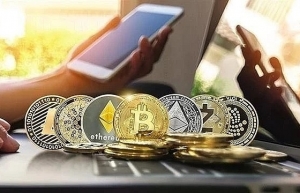INTERNATIONAL INVESTMENT
AND PORTAL
 Tran Huyen Dinh, chairman of the Fintech Application Committee under the Vietnam Blockchain Association (VBA)
Tran Huyen Dinh, chairman of the Fintech Application Committee under the Vietnam Blockchain Association (VBA)
What opportunities and challenges has the Law on Digital Technology Industry opened up for Vietnam’s cryptoasset market since its promulgation in June?
The National Assembly adopted the Law on Digital Technology Industry on June 14, marking a significant milestone in shaping the digital asset market in Vietnam.
For the first time, concepts such as digital assets, virtual assets, and cryptoassets are clearly defined in the law, establishing a solid legal framework for an industry that is rapidly growing globally. This is not only a legal milestone but also a signal that Vietnam is indeed poised to unlock a potentially massive market, with estimates suggesting it could be worth hundreds of billions of dollars, as highlighted in reports by Chainalysis.
The Law on Digital Technology Industry serves as a precursor to attracting foreign investment. A clear and transparent legal framework will provide international investors with more peace of mind when participating in the digital asset sector in Vietnam, which was a major barrier in the past.
For businesses in the digital technology, fintech, and blockchain sectors, the law helps legitimise activities such as fundraising, international cooperation, company valuation, and the development of innovative products. More importantly, the law along with the strong support from the government demonstrates the strategic vision and consistent efforts of the government in building a cohesive legal ecosystem and developing high technology in a synchronised manner.
However, to realise that potential, it is imperative to swiftly issue legal documents such as decrees and circulars for specific guidance under the law to ensure feasibility and consistency in enforcement.
What impact will the new regulations have on blockchain businesses and digital asset projects, especially foreign projects planning to enter the Vietnamese market?
Although the Law on Digital Technology Industry is a significant step forward in introducing concepts such as digital assets and cryptoassets into the legal framework for the first time, currently the law primarily focuses on definitions.
In order to implement and promote new business models in practice, the market is in great need of legal guidance documents such as decrees and circulars to provide further clarification on licensing mechanisms, supervision, taxation, and compliance obligations.
For foreign enterprises and international investors, Vietnam continues to be evaluated as one of the most promising markets in the APEC region, thanks to its young population, high technology adoption rate, and impressive digital economic growth. However, when approaching the market, legal factors remain a top concern. Therefore, we expect that the establishment of the international financial centre, combined with experimental policies such as the sandbox mechanism, will be a crucial catalyst in creating a safe, flexible, and innovative legal environment.
When the new legal framework is applied, what issues should individual investors pay attention to in order to protect their rights and comply with the law?
With the new legal framework, the rights of investors are strengthened more clearly, but at the same time, it also requires users to enhance their awareness and personal legal competence.
First and foremost, users need to distinguish between legally recognised digital assets and anonymous products that are unlicensed or risky. Buying, holding, or investing in assets without clear authenticity carries the risk of capital loss and may also be linked to legal responsibilities.
Secondly, it is important to prioritise the use of platforms, wallets, exchanges, and services that have been publicly tested or confirmed by authorised agencies or reputable organisations. In the near future, test bed or sandbox models will be implemented, and people should choose services within the controlled ecosystem to ensure safety.
Thirdly, investors need to be cautious of high-profit models without technological or legal basis, especially multi-level fundraising models, self-issued tokens without a whitepaper, lack of transparency in pricing mechanisms, or source code auditing. With a clearer legal framework, participation in illicit activities will be strictly dealt with according to current laws.
What specific proposals or actions does the VBA have to support the community in the context of the new legal framework being applied?
In its policy advisory role, the VBA is collaborating with the Ministry of Finance, the Ministry of Science and Technology, the State Bank of Vietnam, and specialised units to gather opinions and contribute to refining regulations for implementation under the law.
The VBA and ABAII Institute are implementing a knowledge dissemination programme for four target groups: management agencies, businesses, schools, and the community.
In terms of collaboration, the VBA is expanding connections with regulatory agencies, universities, tech companies, and international organisations to share experiences and resources. In the upcoming phase, the focus will be on sandbox testing, developing the digital financial ecosystem, blockchain talent resources, and investment connections. We are also collaborating with units such as the Government Cipher Committee to establish standards on security, infrastructure development.
With the efforts of organisations like the VBA, the digital asset market in particular, and the overall digital economy of Vietnam, will seize the opportunity to develop in a transparent and modern manner, making Vietnam a centre for digital asset service development in the region.
 New regulations could help legitimise digital assets
New regulations could help legitimise digital assets
New regulations surrounding the pilot of a digital asset exchange will help legitimise crypto assets, entice institutional involvement, and foster regional innovation, opening up a new stream of investment to Vietnam.
 Vietnam legalises digital and crypto assets
Vietnam legalises digital and crypto assets
Vietnam legalised digital and cryptoassets in the Law on Digital Technology Industry passed by the National Assembly on June 14.
 Digital assets finally go legal for Vietnam
Digital assets finally go legal for Vietnam
The official legal recognition of cryptoassets presents both an opportunity to accelerate the growth of the digital tech market and a challenge in mitigating potential related disputes.



















